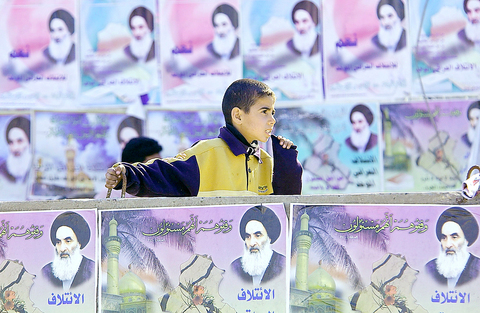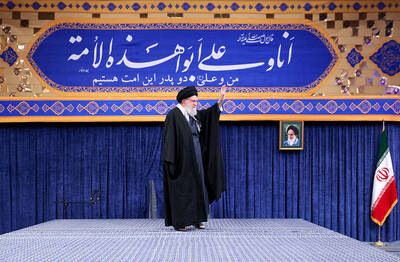Thousands of election posters bearing his image are plastered on walls, concrete blast barriers, shop and car windows. His name comes up in almost any conversation about next Sunday's historic vote. Many say they'll vote just because he's said they should.
Yet he isn't even running.

PHOTO: AP
Grand Ayatollah Ali al-Sistani is by far the dominant figure in the vote and the slate of candidates he has endorsed is likely to fare best in Iraq's national elections.
It's a reflection of the vast influence al-Sistani has gained in the relatively short time since former president Saddam Hussein's ouster 21 months ago. But it also raises questions about the consequences of one man mustering so much power in a country that lacks democratic traditions.
"The involvement in politics by the religious leadership has given terrorists a pretext for their violence and sectarianism," said Ali Yasseri, a Shiite activist and a Baghdad University political science researcher.
Iraq's Shiites are embracing the weekend vote in the hope that it would give them the power they have been denied for generations by the Sunni Arabs. Minority Sunni Arabs are not expected to participate in large numbers because they fear attacks by insurgents or to protest the presence of foreign troops in Iraq.
Religion moved to the heart of politics in postwar Iraq, with clergy-laymen alliances proving to be far more effective than mainstream political parties. In this new climate, al-Sistani stands head and shoulders above all others.
His influence is likely to increase when, as expected, voters elect a Shiite-dominated parliament on Sunday. Potentially, that will give the Iranian-born cleric the leverage he needs to influence the writing of the country's permanent constitution, which will be undertaken by the 275-seat assembly and put to a nationwide vote later this year.
A close al-Sistani aide acknowledged the cleric's concern about the constitution, saying that he would not have played such a prominent role in the vote had it not been for his belief that the assembly's key task was to draw up a constitution.
"This is a very important election," Hussain al-Shahristani, a nuclear scientist once jailed by Saddam, told reporters. "The assembly will write the constitution that will guarantee the future of Iraq. He wouldn't have done this if it was just another election," said Shahristani, himself a candidate running on the slate endorsed by al-Sistani.
The white-bearded cleric is expected to plunge anew into politics when the assembly begins to draft the constitution which, if adopted in a referendum scheduled to be held by Oct. 15, will be the basis for a second general election before Dec. 15.
Key issues like the role of Islam and the extent of federalism to be allowed in Iraq are expected to be tackled in the new constitution.
Al-Sistani has so far remained noncommittal on both issues, but has in the past suggested that his wish to see Iraq remain as one united nation leaves him in disagreement with Kurdish aspirations for self-rule. He also is known to be in favor of declaring Islam as the official faith of the country.
"The religious leadership has repeatedly stated that it has no wish to involve itself in political work and prefers for its clerics not to assume government positions," al-Sistani has said in a fatwa, or edict, designed to put to rest speculation that he wanted Iraq to have an Iranian-style clerical regime.
Al-Sistani, believed to be in his mid-70s and with a heart ailment, has forced Washington at least twice since Saddam's ouster to modify or altogether abandon political plans for postwar Iraq so as to accommodate his demands for elections.
"Because of his repeated calls for election, he's become a symbol for all Iraqis," said Salama Khafaji, a prominent female Shiite politician and a candidate for the National Assembly in Sunday's election.
Al-Sistani left his native Iran in 1952 and has since resided in the Shiite holy city of Najaf south of Baghdad. He came to national prominence when he succeeded his mentor Abu al-Qasim al-Khoei, who died in 1992. The mystery killing of a rival cleric, Mohammed Sadiq al-Sadr, in 1999 left him as Iraq's most senior Shiite cleric.
Al-Sistani rarely leaves his Najaf home, where he receives tribal leaders and dignitaries who come for advice on anything from politics to mundane personal matters. He grants no media interviews, but answers questions on religious matters on his Web site.

Shamans in Peru on Monday gathered for an annual New Year’s ritual where they made predictions for the year to come, including illness for US President Donald Trump and the downfall of Venezuelan President Nicolas Maduro. “The United States should prepare itself because Donald Trump will fall seriously ill,” Juan de Dios Garcia proclaimed as he gathered with other shamans on a beach in southern Lima, dressed in traditional Andean ponchos and headdresses, and sprinkling flowers on the sand. The shamans carried large posters of world leaders, over which they crossed swords and burned incense, some of which they stomped on. In this

Indonesia yesterday began enforcing its newly ratified penal code, replacing a Dutch-era criminal law that had governed the country for more than 80 years and marking a major shift in its legal landscape. Since proclaiming independence in 1945, the Southeast Asian country had continued to operate under a colonial framework widely criticized as outdated and misaligned with Indonesia’s social values. Efforts to revise the code stalled for decades as lawmakers debated how to balance human rights, religious norms and local traditions in the world’s most populous Muslim-majority nation. The 345-page Indonesian Penal Code, known as the KUHP, was passed in 2022. It

‘TRUMP’S LONG GAME’: Minnesota Governor Tim Walz said that while fraud was a serious issue, the US president was politicizing it to defund programs for Minnesotans US President Donald Trump’s administration on Tuesday said it was auditing immigration cases involving US citizens of Somalian origin to detect fraud that could lead to denaturalization, or revocation of citizenship, while also announcing a freeze of childcare funds to Minnesota and demanding an audit of some daycare centers. “Under US law, if an individual procures citizenship on a fraudulent basis, that is grounds for denaturalization,” US Department of Homeland Security Assistant Secretary Tricia McLaughlin said in a statement. Denaturalization cases are rare and can take years. About 11 cases were pursued per year between 1990 and 2017, the Immigrant Legal Resource

ANGER: US-based activists reported protests at 174 locations across the country, with at least 582 arrested and 15 killed, while Khamenei said the protesters were ‘paid’ Iran’s supreme leader on Saturday said that “rioters must be put in their place” after a week of protests that have shaken the Islamic Republic, likely giving security forces a green light to aggressively put down the demonstrations. The first comments by 86-year-old Ayatollah Ali Khamenei come as violence surrounding the demonstrations sparked by Iran’s ailing economy has killed at least 15 people, according to human rights activists. The protests show no sign of stopping and follow US President Donald Trump warning Iran on Friday that if Tehran “violently kills peaceful protesters,” the US “will come to their rescue.” While it remains